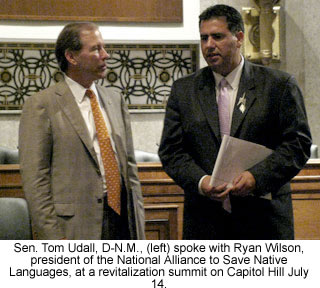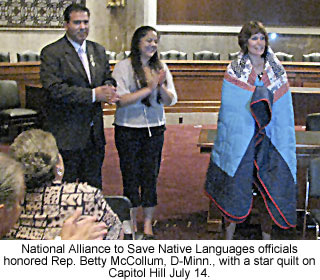 |
Canku Ota
|
 |
|
(Many Paths)
|
||
|
An Online Newsletter
Celebrating Native America
|
||
|
August 1, 2010 - Volume
8 Number 8
|
||
|
|
||
|
Native Voices Heard
At National Language Summit
|
||
|
by Rob Capriccioso for
Indian Country Today
|
||
|
credits: Photos by Rob
Capriccioso
|
|
That was the message of a group of Indian educators who gathered for the National Native Language Revitalization Summit on Capitol Hill July 13 – 14 to make legislators and administrators aware of their concerns and desire for support. Meetings with Congress members and Obama administration officials took place throughout, and some federal officials took part in the event, promising to help strengthen Native languages. Ryan Wilson, president of the National Alliance to Save Native Languages, highlighted a plethora of reasons for increased language support from the federal government. Chief among them is the ability to save cultures that have been treaded upon for hundreds of years, yet still survive, he said. Cultural Survival Quarterly recently reported that "unless dramatic action is taken now, more than 70 Native American languages will become extinct within the next 10 years." The publication helped sponsor the summit, citing its concern about the situation. "We are at a unique moment in history for the federal government to assist with the revitalization of Native language and culture," Wilson told a gathering of legislators and tribal officials at the Senate Dirksen Office Building July 14. To hammer that point home, the group released a request for a White House initiative on Native language revitalization with the idea that it would oversee agency coordination and establish a national working group and conference on the issue. "It is not overstating the case to assert that without a coordinated federal approach, increasing numbers of Native American languages will go extinct in the immediate future," according to the request document. "Those who may ask why the federal government has a role in revitalizing Native American languages need only look to the sorry history of federal regulations and practices to obliterate Native languages – and to the recent administrative efforts to undermine them – to find an affirmative obligation to help save those languages that remain."
Jefferson Keel, president of the National Congress of American Indians, which co-hosted the summit, said the organization passed a resolution supporting a White House executive order on Native languages at its June conference. The resolution declares Native languages in "a state of emergency" and calls on the White House to take action. Wilson asked Keel for NCAI to develop a press release regarding the resolution, given its historical significance. Regarding recent federal negative impacts on Native culture, many attendees decried certain aspects of the No Child Left Behind Act under the Bush administration. Parts of that law relied too heavily on testing and accountability to the detriment of Indian cultural learning, some educators said. There have also been positive federal developments in recent years, including the Native American Languages Act and the Esther Martinez Act. But Wilson explained to several legislative aides that inconsistent administrative rules and regulations have undercut some of the progress provided for under those laws. Wilson noted that some legislative rules that impact immersion schools, which are important to some tribal communities, end up shortchanging federal funding. Legislative staffers said they would look at ways to address the issue in the appropriations process. Wilson believes there is a need for a $3 million to $5 million specific appropriation to eligible institutions. Interior Assistant Secretary of Indian Affairs Larry EchoHawk said at the event that his department needs to hear more from Native educators on language revitalization matters. He invited Wilson to meet with department officials on steps forward. |
|
|
||
|
|
||
| Canku Ota is a free Newsletter celebrating Native America, its traditions and accomplishments . We do not provide subscriber or visitor names to anyone. Some articles presented in Canku Ota may contain copyright material. We have received appropriate permissions for republishing any articles. Material appearing here is distributed without profit or monetary gain to those who have expressed an interest. This is in accordance with Title 17 U.S.C. Section 107. | ||
|
Canku Ota is a copyright ©
2000, 2001, 2002, 2003, 2004, 2005, 2006, 2007, 2008, 2009, 2010
of Vicki Barry and Paul Barry.
|
||
 |
 |
|
|
The "Canku
Ota - A Newsletter Celebrating Native America" web site and
its design is the
|
||
|
Copyright ©
1999, 2000, 2001, 2002, 2003, 2004, 2005,
2006, 2007, 2008, 2009, 2010
of Paul C. Barry.
|
||
|
All Rights Reserved.
|
||
 WASHINGTON
– Native languages are alive and well, and they need the
federal government to help their voices flourish.
WASHINGTON
– Native languages are alive and well, and they need the
federal government to help their voices flourish.
 Some
Congress members seemed more than compelled. "I think you're
fighting for something that is so important," Sen. Tom Udall,
D-N.M., told attendees. "If you don't have language, the
culture disappears."
Some
Congress members seemed more than compelled. "I think you're
fighting for something that is so important," Sen. Tom Udall,
D-N.M., told attendees. "If you don't have language, the
culture disappears."